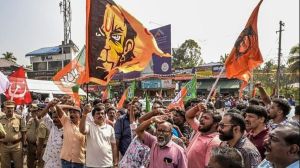Explained: Why Kalamsat V-2 is both a small step and a giant leap for India in space
A 12-member team, comprising youngsters mostly in the age of 19 and 21 years, built the satellite.
 The Kalamsat V-2 is a communication satellite prototype built entirely by students and fresh graduates. Photo: SpaceKidz
The Kalamsat V-2 is a communication satellite prototype built entirely by students and fresh graduates. Photo: SpaceKidz
The Kalamsat V-2 satellite, one of the payloads on the PSLV C-44 that was launched on Thursday, was the second satellite built, and launched, by Space Kidz India, a Chennai-based private organisation that claims to groom young scientists. Their first satellite, also called Kalamsat, went into space on a NASA rocket in 2017, but it was a sub-orbital flight, meaning it was not put into an orbit.
The Kalamsat V-2 is a communication satellite prototype built entirely by students and fresh graduates. As of now, it is just a technology demonstrator and would not be put to any use. Mohammed Abdul Kashif, the lead engineer, said his team had produced a new electronic architecture for this satellite that ensured that it was lighter, smaller, more economical and consumed less energy while functioning like any other communication satellite. He said Kalamsat V-2 can be used in disaster management scenarios, early warning systems and as backup satellite for other uses. “There are a wide variety of uses it can be deployed for. But with this launch, we are only testing the technology and seeing how it operates,” he said.
A 12-member team, comprising youngsters mostly in the age of 19 and 21 years, built the satellite. Some members in the team are engineering graduates, while others are students. The youngest member is pursuing undergraduate studies in Physics. Kashif said while the actual building of the satellite had taken just 6-7 days, at least four years of research had been invested in putting it together.
ISRO chairman Dr K Sivan said: “We must strive for science-oriented India. ISRO is open to all students across India. We want students to bring their satellites to us and we will launch them. Young scientists will shape the future of India.”
Don’t miss from Express Explained: How India’s Republic Day Chief Guest is chosen
- 01
- 02
- 03
- 04
- 05





































